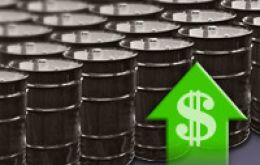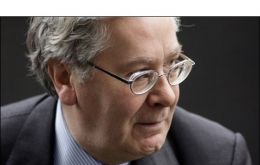MercoPress. South Atlantic News Agency
Tag: oil price
-
Thursday, February 24th 2011 - 00:16 UTC
Airlines face “very serious challenge” because of soaring oil prices, says IATA

Surging oil prices due to political turmoil in the Middle East spell “very, very big challenges” for airlines, said International Air Transport Association chief Giovanni Bisignani on Wednesday.
-
Wednesday, February 23rd 2011 - 07:02 UTC
OPEC promises to compensate for any oil drop off by unrest in Middle East

Trying to calm turbulent oil markets, Saudi Arabia's Oil Minister said on Tuesday that the Organisation of the Petroleum Exporting Countries (OPEC) was ready to pump more oil to compensate for any drop-off caused by unrest in the Middle East.
-
Tuesday, February 22nd 2011 - 00:03 UTC
China raised fuel prices for the second time in three months

China has raised fuel prices for the second time in three months as it looks to offset a jump in global crude costs. However, the move has raised questions over government attempts to slow inflation.
-
Sunday, January 30th 2011 - 20:23 UTC
Volatility Oil Prices, Futures Rise Most Since 2009

Oil options volatility increased as the underlying futures surged the most since September 2009 as unrest in Egypt raised concern that protests would spread to major oil-producing parts of the Middle East.
-
Sunday, January 23rd 2011 - 16:26 UTC
Opportunity for Latin America?

The dynamics of the past few months regarding the price of oil, prime materials and food stuffs, worryingly reminds us of what happened to the world economy mid-2008. At the time the sky high price of oil – which reached U$147 a barrel - and the food crisis caused havoc.
-
Sunday, December 12th 2010 - 23:31 UTC
Saudi’s 70/80 US dollars a barrel stance prevails at OPEC meeting in Ecuador

Leading OPEC producer Saudi Arabia said it still favoured a 70-80 US dollars price range for oil, a restatement of a two-year-old policy that will be welcomed by consumer nations worried that rising oil prices may get out of control and hamper global economic recovery.
-
Tuesday, May 18th 2010 - 21:53 UTC
UK consumer inflation reaches 17-month high in April

United Kingdom consumer price inflation unexpectedly jumped to a 17-month high in April, 3.7%, driven by big rises in tax on alcohol and tobacco as well as higher prices for women's clothing and food, data showed.
